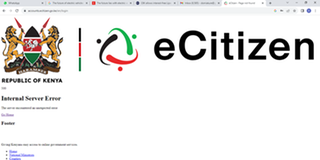Premium
Court halts mandatory school fees payment via eCitizen

A screenshot of the eCitizen platform. The government was on Tuesday dealt a blow after the High Court in Nairobi quashed its directive requiring parents to pay school fees through the e-Citizen platform.
What you need to know:
- President William Ruto supported the move stating that the platform was unstoppable as it will help eliminate the payment of illegal levies by some schools.
- “Cash payments are prone to abuse and we want to reduce and eventually end them,” President Ruto said while on a tour of Tokyo in Japan.
The government was on Tuesday dealt a blow after the High Court in Nairobi quashed its directive requiring parents to pay school fees through the eCitizen platform.
eCitizen, a Kenyan e-government initiative, is an online platform that provides government services and information to citizens of the East African country.
Justice Chacha Mwita ruled that the directive for payments of fees and other levies for all government learning institutions to be made through eCitizen had no legal basis.
The judge further ruled that the Sh50 convenience fee amounted to a double charge and that people cannot be forced to use a system they did not ask for and be made to maintain it by paying an extra charge.
“This is irrational and unconscionable. There was also no explanation regarding who would receive the convenience fee and what it is used for making the charge unlawful,” said the judge.
Nakuru-based surgeon Benjamin Magare-Gikenyi challenged the circular issued by former Education PS Belio Kipsang’ on January 31, 2024, requiring parents, guardians, and students to pay fees and other levies through the platform.
Dr Magare-Gikenyi submitted that the decision to compel parents to pay fees through the platform was arrived at without public participation, and without respecting statutory and constitutional safeguards.
“The court comes to the following conclusions; first there was no legal basis for directing parents to pay school fees through the eCitizen platform.
The directive was issued without stakeholders’ engagement in the education sector in violation of the constitution,” said the judge, adding that strictly speaking, school fees were not government money.
The judge said the directive failed to take into account those parents who cannot access internet services, have no phones, and who pay school fees in kind, in violation of their legitimate expectations.
“The directive causes potential indirect discrimination. The propriety of the eCitizen system payment platform, its ownership as well as transparency and accountability of the system is questionable,” Justice Mwita said.
According to the court, it would be inappropriate to deny that parents pay school fees to a system whose integrity was in doubt.
“This would also put schools in a difficult financial position in the case of delayed remittances or fewer remittances as the case may be,” he said.
The court further said data protection for those using the system cannot be guaranteed, making it a threat to people’s rights and data, in violation of the law.
“An order of prohibition is hereby issued prohibiting the Cabinet Secretary Treasury, Cabinet Secretary, ICT and Digital Economy, and Cabinet Secretary, Education, either by themselves, their agents, servants, or any person on their behalf from demanding that school fees be paid through the e-citizen payment platform or giving effect to the directive dated 31st January 2024,” said the judge.
In a circular sent to the national school principals last week, Dr Kipsang directed principals of national schools to submit bank details of their institutions to enable parents to pay fees through the eCitizen platform.
Dr Gikenyi said forcing parents to pay their school fees through eCitizen without their public participation was absurd and irrational.
President William Ruto supported the move stating that the platform was unstoppable as it will help eliminate the payment of illegal levies by some schools.
“Cash payments are prone to abuse and we want to reduce and eventually end them,” President Ruto said while on a tour of Tokyo in Japan.
A nominal access fee of Sh50 per transaction or US$1 per transaction for foreign designated currency transactions, is charged unless waived by the CS Treasury.





